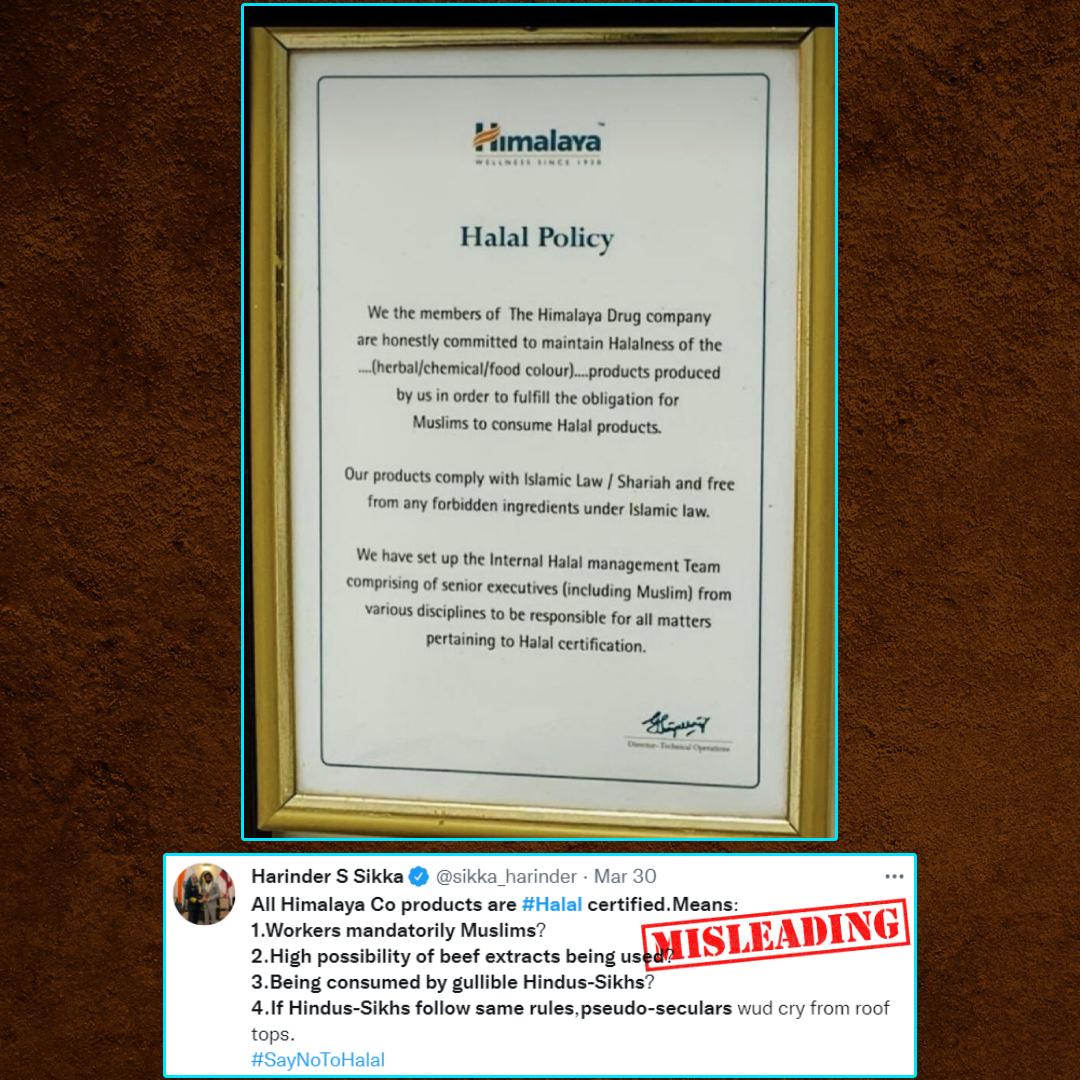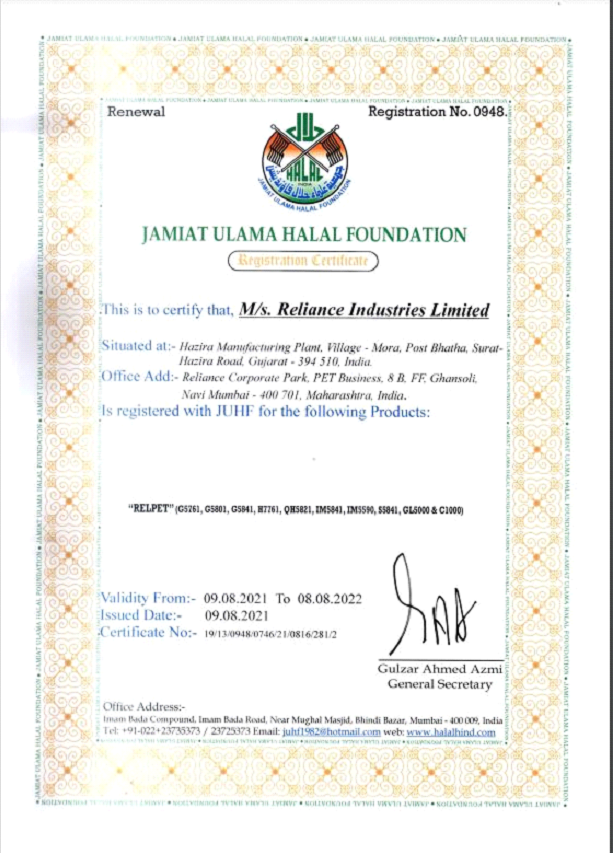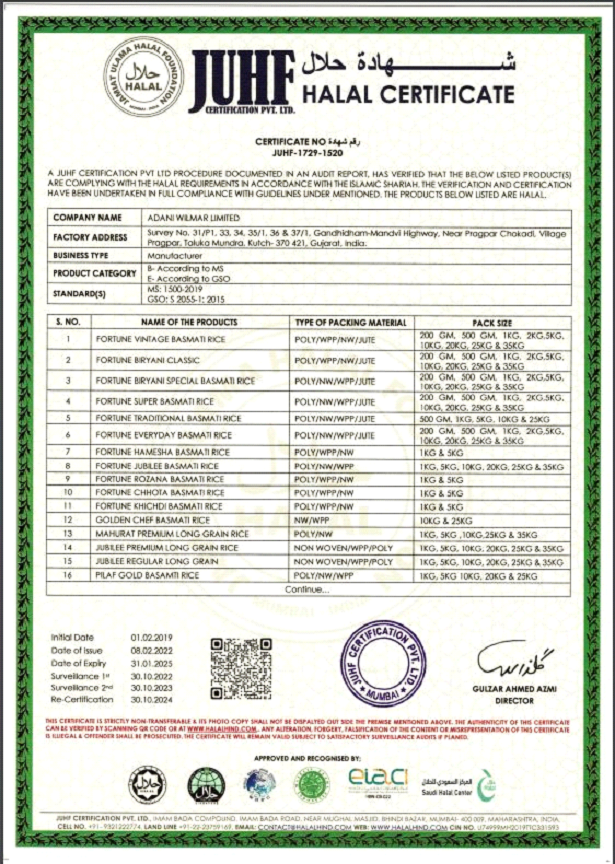
Image Credit: Twitter
India
Halal Certification Doesn't Mean Use Of Meat In Products; Hate Campaign Against Himalaya Based On False Assumptions
 |
|Halal certification is required to comply with the importing country's laws and regulations. Tata Consumers Products and Adani Wilmar also feature on the list of companies that have received halal certification.
Right-wing groups in states such as Karnataka have appealed for the ban of halal meat products. What started with conspiracy theories around 'Love Jihad' has now been spreading rapidly to campaigns against the use of Halal meat.
Misinformation campaigns against the consumption of halal meat have now targetted Himalaya, a pharmaceutical company based in Bengaluru. Social media users have claimed that due to Himalaya's halal policy, the company actively uses beef extracts in its products and that its workforce is largely composed of Muslims.
What is Halal Meat?
As per this article by the Islamic Council, halal is a word that means lawful or permitted. "The term is used to designate food seen as permissible according to Islamic law," the website reads.
The opposite of halal is haram, and the two universal terms feature in all aspects of Islam. These two aspects apply to food products, pharmaceuticals, meat products, personal care products etc.
Usually, halal foods are free from any component that Muslims are prohibited from consuming and are processed or produced following Islamic law.
According to this BBC article, the Islamic form of slaughtering animals or poultry for meat involves a cut to the jugular vein, carotid artery, and windpipe to kill the animal.
#SayNoToHalal and #Boycott Himalaya:
The #Boycott Himalaya has been spread across social media by prominent Twitter personalities like Harinder S. Sikka and Paresh Rawal.
Sikka especially put across his interpretations of the halal disclaimer, hinting that the workers mandatorily are Muslims and there is a high possibility of beef extracts in all Himalaya products.
In a statement on their Twitter page, Himalaya clarified that halal certification is required to comply with the importing country's laws and regulations. The company also clarified that no Himalayan products use meat.
Despite the clarification, the #BoycottHimalaya trend is viral across Twitter, with several viral tweets spreading misinformation about Halal certification in Indian products.
This viral tweet puts across a comparison between Patanjali and Himalaya products.
This has gone viral irrespective of Patanjali receiving a halal certificate in 2021, as per this Firstpost article.
Acharya Balkrishna, the general secretary of Patanjali Yogpeeth, had even clarified that the halal certification is for exporting Ayurvedic medicines to Gulf countries and not for exporting meat. He termed the allegations as a "conspiracies and rumors", as per this Times of India report.
The following tweet claims that Himalaya produces products containing halal according to Muslim law because it is a Muslim owned business.
On the contrary, industry leaders such as Reliance Industries, Tata Consumers Products and Adani Wilmar feature on the list of companies that have received halal certification from the JUHF Halal Committee. JUHF Halal Committee oversees the application of the term Halal with specific reference to Islamic dietary laws for Indian products.


This certification is required for exporting to Gulf countries, and lets Muslims assess which product is permissible for them to eat.
Controversies Surrounding Brands and Halal Meat:
The right-wing groups in Karnataka conducted door-to-door campaigns advocating against the use of halal products. Sales for halal meat products dipped due to the campaigns by these groups, as per this The Print article.
iD Fresh Foods, which sells idli and dosa batter, faced similar controversies last year. Musthafa PC, the company's founder, stated that dubious WhatsApp forwards were categorically false.
The forwards claimed that the company only hired Muslims and that calf rennet and cow bones are used to increase the volume of the batter. As per MoneyControl, Musthafa stated that the company uses products with vegetarian ingredients which are made in a facility that adheres with the food safety management system.
The Logical Indian had covered another misinformation campaign centred around Halal food preparation. The social media posts claimed that Halal is not complete until the cook does not spit in it. However, the 'court proceedings' which the tweet refers to is a written plea by a Hindu petitioner, and the tweet does not provide the entire context of the court proceedings.
Conclusion:
The viral social media posts with hashtags #BoycottHimalaya and #SayNoToHalal promote misinformation against the consumption of halal meat and Himalaya's halal policy. The misinformation campaigns are not based on an understanding of Islamic dietary practices, regulations and import requirements for halal products and instead seem to be motivated by prejudice against Muslims.
If you have any news that you believe needs to be fact-checked, please email us at factcheck@thelogicalindian.com or WhatsApp at 6364000343.
Also Read: Fact Check: Outrage Over Photo Of Godh Bharai Claiming It To Be Example Of Love-Jihad